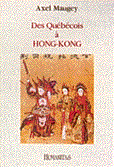 | For A Modest God: New and Selected Poems, Grove Press, 1997, $20, by Eric Ormsby.
McGill Islamic Studies Professor Eric Ormsby opens his latest selection of poems with a short lyric entitled "Quark Fog," a suitable introduction to his work. After contemplating "the temporary desert" of his hand, the narrator observes that "Matter will not/ chisel a voice from this/ fog of quarks." However, "If merest fable drops into the fog,/ articulated stars assert/ eclosion of the gold-sewn chrysalids./ Early nouns bob in blunt fens./ Verbs browse electrically in mist,/ particles gnarl the stems of bulrush copulae."
This fragment illustrates much about Ormsby's poetry, from his challenging vocabulary (readers should bring a dictionary) to his powerful conjunction of human and natural worlds. His subjects, often drawn from nature, may seem removed from urban commerce yet never fail to engage the reader. In "The Ant Lion," the narrator opens with an appreciative, even humorous explanation of the ant lion's snare, in which "Precarious/ sand grains have been set to slide/ whenever a plodding ant's insouciance/pitches it down that soft declivity"; then he returns as a young boy with anxious nightmares of "falling . . . / through filmy floorboards into avalanche/ as the heart-stopped terror of my helpless dream/ tossed me to the soft mouth of this pit." The poem concludes with the ant lion, by now a creature imbued with human qualities: ". . . After the waving prey is tugged below/ to be consumed in secret, beneath the dirt,/ the ant lion's slow return looks dreamlike, too./ There's a proprietary fussiness,/ meticulous, almost suburban, as/ the little killer scrapes his whirlpool smooth." The insect becomes something that is even more terrible, yet frighteningly human.
Just over a third of the 85 poems in this selection are new, with the remainder collected from two earlier publications. For A Modest God is a satisfying introduction to the work of one of the country's unacclaimed masters.
by Patrick McDonagh
|
 | Latest News from the Cosmos, Translated from French by Donald Winkler, Stoddart, 1997, $29.95, by Hubert Reeves, MSc'56.
The Big Bang theory of cosmology is arguably the greatest achievement of twentieth century physics. It dares to describe our history as beginning with an explosion some 10 to 15 billion years ago.
This important idea should be communicated to the public at large and who better than Hubert Reeves to carry out this important task? Reeves, a nuclear astrophysicist and award-winning popularizer of science, studied at McGill with former principal Robert Bell following his undergraduate degree at Université de Montréal. Reeves is now Director of Research at the Centre nationale de la recherche scientifique in Paris.
Latest News from the Cosmos will appeal to both the interested amateur and the committed student of physics. Reeves describes ancient religious and legendary cosmologies which underline the basic human need to understand one's origins and then goes through the evidence and reasoning that have led to the Big Bang theory. He covers the now classical results such as Hubble's observation of the recession of distant galaxies, the prediction of the cosmic abundances of light elements and the discovery of microwave background radiation. He also discusses more contemporary issues such as the problems of dark matter and the origin and distribution of galaxies.
There are some flaws in the book. The graphics are rather primitive. As well, the editors have missed a few mistakes in translation from French to English. At least one essential date and one of the most important names are wrong. On balance, however, this is a worthwhile book and I recommend it highly.
David S. Hanna, BSc'75
Professor of Physics
McGill University
|
 | Les Québécois à Hong Kong, Humanitas, $19.95, 1997, 169p, par Axel Maugey, Professeur de littérature française, Université McGill.
Le titre de ce livre ne peut manquer de surprendre; dans ces mois qui entourent la rétrocession de Hong-Kong à la Chine populaire, nos pensées se tournent davantage vers la population autochtone que vers les Occidentaux et Occidentales qui y poursuivent leur carrière. Notre auteur, qui enseigne les civilisations francophones à l'Université McGill, a cependant voulu profiter de la conjoncture politique pour interviewer un certain nombre de Québécoises et de Québécois--tous
à une exception près, ayant une certaine expérience de la vie des affaires à Hong-Kong--pour nous faire profiter aujourd'hui de leurs lumières.
Le but est louable, et il est parfois intéressant de suivre les méandres des carrières de ces quatorze personnes, à commencer par le vieux missionnaire jésuite, Lionel Tremblay, qui a mis les pieds en
Chine pour la première fois en 1939. Ensuite, c'est à des hommes et à des femmes d'affaires, aux ambitions et aux idées diverses, que Maugey donnera la parole.
Malheureusement, l'ensemble reste au niveau de l'anecdote. La dernière page tournée, le lecteur (comme la lectrice) reste sur sa faim en ce qui concerne toute analyse sérieuse de la situation actuelle ou future de Hong-Kong, et les entretiens rappellent davantage le cocktail mondain que l'enquête universitaire. Le style même de l'ouvrage, apparemment rédigé à la va-vite, finit par exaspérer, tant il s'y trouve de répétitions, de maladresses, de déclarations à l'emporte-pièce et de stéréotypes. Dommage.
Maïr Verthuy
Professeure, Département d'études françaises
Université Concordia
|